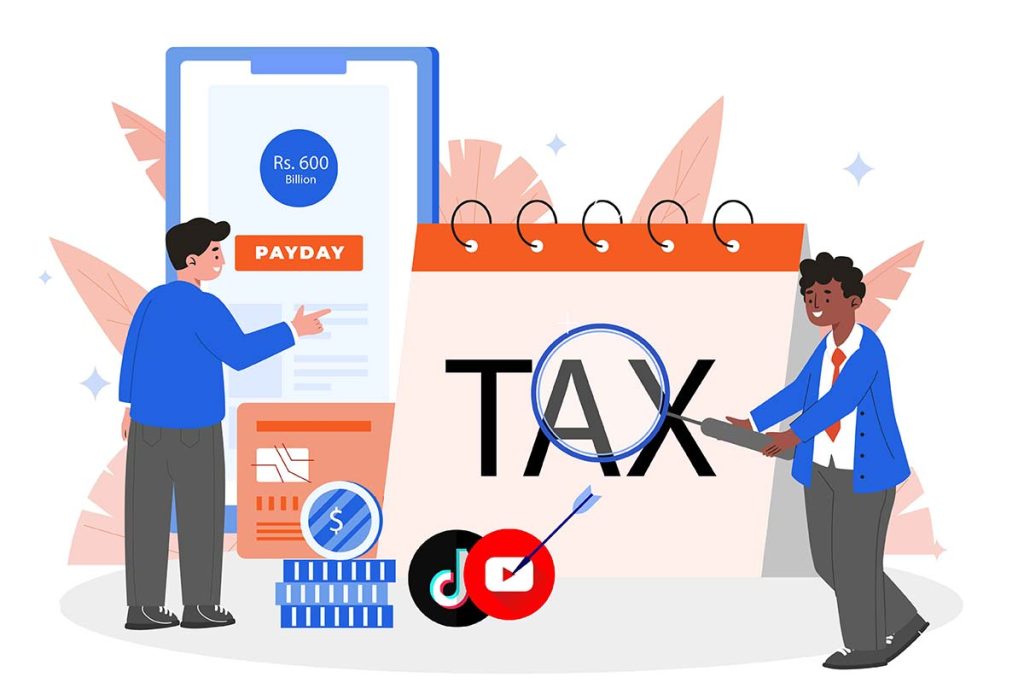The federal government is planning to introduce new tax measures worth up to Rs. 600 billion in the 2025–26 budget. These taxes will mainly target the income of freelancers, vloggers, TikTokers and YouTubers. In this thorough article, our Tashheer research team has clearly explained everything about the new tax plan that targets freelancers and YouTubers as part of the government’s Rs. 600 billion revenue push. As per Topline Securities, a 3.5% tax is being proposed on income from social media platforms like YouTube and TikTok which could bring in around Rs. 52.5 billion. Pakistani government is also considering a 2.5% to 5% tax on pensions that are more than Rs. 400,000 per month which could generate Rs. 20 to 40 billion. This comes at a time when pension costs have already reached Rs. 673 billion and may rise to Rs. 1 trillion.
Details about the New Tax Plan
Plus, Pakistani government plans to adjust GST (sales tax) on certain items based on real market prices, using data from the Pakistan Bureau of Statistics. For example, sugar is currently taxed at Rs. 72.22 per kg while the market price is Rs. 150. This price adjustment could help collect another Rs. 70 to 80 billion in revenue. Pakistani government is planning to increase the federal excise duty by 20% on processed foods like snacks and biscuits, to raise it to 50% by 2029. Many audit firms in Pakistan are doing audits. Taxes on cigarettes may also go up. A new bill has been submitted to remove the “nonfiler” category, meaning people who don’t file taxes will no longer be allowed to buy vehicles or property. A new section, 114C, might be added to the Income Tax Ordinance, possibly changing the income thresholds.
Important Information
Background: Pakistan’s Tax Challenges

Pakistan has long struggled with low tax-to-GDP ratios with less than 2% of the population filing income tax returns. Traditional sectors like agriculture, wholesale trade and real estate often remain under-taxed while formal sector workers bear the brunt of taxation. With mounting debts, a shrinking fiscal space and pressing IMF obligations, the government is under immense pressure to enhance revenue collection.
In this context, the Finance Bill 2025 introduces measures to tap into digital income streams specifically targeting freelancers, vloggers, YouTubers, TikTokers and influencers who earn substantial revenue online but often fall outside the tax radar.
What the New Tax Plan Proposes
Mandatory Registration
Freelancers and digital content creators earning above a certain threshold (reportedly Rs. 600,000 annually) will now be required to register with the Federal Board of Revenue (FBR) and file annual tax returns.
Flat Tax on Digital Income
A flat tax rate between 5% to 15% is being proposed on digital income, depending on income slabs. This includes earnings from:
1. YouTube AdSense and Super Chat
2. Sponsored content and brand deals
3. Affiliate marketing
4. Freelance platforms like Upwork, Fiverr, Toptal and Freelancer
5. Patreon and other crowdfunding platforms
Withholding Tax at Source
Banks and digital payment gateways may be required to withhold a certain percentage of income from foreign remittances or advertising revenue and remit it directly to the FBR.
Data Sharing Agreements
The government is planning to work with global platforms like Google and Meta to obtain data on earnings by Pakistani users. The State Bank of Pakistan (SBP) and commercial banks will also be tasked with flagging high-value transactions.
Incentives for Compliance
First-time filers may be offered lower tax rates, audit protection for a limited time or amnesty options to encourage voluntary disclosure.
Why Freelancers and YouTubers Are Being Targeted
The digital economy in Pakistan has witnessed exponential growth over the past decade. According to the Pakistan Software Export Board (PSEB), the country’s IT and freelance export sector crossed the $3.5 billion in 2024.
Similarly, platforms like YouTube and TikTok have seen a surge in Pakistani creators with millions of subscribers and followers. Many of these influencers earn tens of thousands of dollars a month from international sources, yet many are not officially on the tax rolls.
Pakistan is among the top 5 countries on Upwork & Fiverr in terms of active freelancers. By bringing these income streams into the formal economy, Pakistani government aims to ensure fairness, reduce tax evasion and create a more sustainable revenue model.
Public Reaction and Concerns
While the government sees the move as necessary, many freelancers and digital creators have raised concerns:
Lack of Clarity
Many worry about vague definitions of digital income and fear double taxation on the same earnings.
Fear of Harassment
Some fear misuse of tax laws by officials especially if income data is misinterpreted or privacy is breached.
Impact on Small Creators
Smaller YouTubers or new freelancers earning modest amounts may feel unfairly taxed meant for higher earners.
Banking Hurdles
Freelancers already face issues receiving international payments due to PayPal’s absence in Pakistan but still there are some banks for freelancers that they can user for their earnings. Additional red tape could further complicate matters.
Expert Opinions
“The digital economy is real and growing, and it must be taxed but taxation must be fair, progressive and accompanied by strong taxpayer facilitation.”
“We need simplified tax regimes for freelancers and content creators. The current system is not designed for micro-entrepreneurs working from home. The new plan must address ease of compliance.”
Global Comparisons
Countries like India, the UK, and the Philippines already tax digital earnings but often under simplified self-assessment models. For example:
Pakistan can draw from these examples to make its own framework more user-friendly.
What’s Next?
The new tax measures are likely to be passed with the federal budget in June 2025. The FBR is expected to roll out public awareness campaigns, online portals and simplified filing procedures in the coming months. However, successful implementation will depend on:
Final Words
The new tax plan marks a pivotal moment in Pakistan’s journey towards a more inclusive and digitized economy. In this detailed article, our Tashheer research team has clearly explained everything about the new tax plan that targets freelancers and YouTubers as part of the Rs. 600 billion revenue push. By targeting freelancers and YouTubers, Pakistani government hopes to bridge revenue gaps and bring transparency to a booming but unregulated sector. While the intent is justified, the challenge lies in ensuring that these measures don’t stifle digital innovation or punish those who are already economically vulnerable. If implemented with clarity, fairness and digital ease, this tax reform could set the stage for a more balanced and sustainable economic future.





